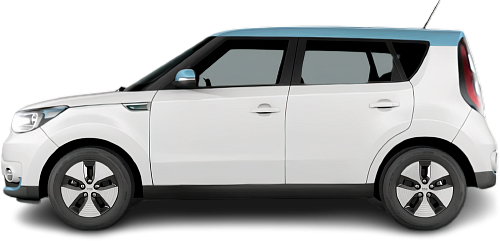USA EV Comparison: Kia Soul EV Gen 1 vs Tesla Model 3 Mid Range
Struggling to Decide? Let AI Help!
Your AI Summary Is Ready!
General Info
Since both vehicles have been discontinued, they are now only available on the used car market. You can get the Kia Soul EV (2014-2017) for as low as $4991, while the Tesla Model 3 Mid Range (2018-2020) begins at $13794.
The Kia Soul EV (2014-2017) is a SUV, whereas the Tesla Model 3 Mid Range (2018-2020) is a Sedan.
| Property | Kia Soul EV Gen 1 | Tesla Model 3 Mid Range |
|---|---|---|
| Years of Production | 2014-2017 | 2018-2020 |
| Current Status | Discontinued | Discontinued |
| Country of Manufacture | South Korea | USA |
| Body Style | SUV | Sedan |
| Market Availability | EU, USA | USA |
| Price USA (Used) | $4991 | $13794 |
| GCC Score | 4.5 | 5.9 |
Range and Efficiency
The Tesla Model 3 Mid Range (2018-2020) boasts a greater real-world range, a larger battery, and superior energy efficiency compared to the Kia Soul EV (2014-2017).
| Property | Kia Soul EV Gen 1 | Tesla Model 3 Mid Range |
|---|---|---|
| Range (EPA) | 93 mi | 264 mi |
| Range (WLTP) | - Range (WLTP) | 284 mi |
| Range (GCC) | 94 mi | 246 mi |
| Battery Capacity (Nominal) | 30.5 kWh | 65 kWh |
| Battery Capacity (Usable) | 27 kWh | 62 kWh |
| Efficiency per 100 mi | 28.7 kWh/100 mi | 25.2 kWh/100 mi |
| Efficiency per kWh | 3.48 mi/kWh | 3.97 mi/kWh |
| Range and Efficiency Score | 4.6 | 7.5 |
Charging
Both vehicles utilize a standard 400-volt architecture.
The Tesla Model 3 Mid Range (2018-2020) offers faster charging speeds at DC stations, reaching up to 200 kW, while the Kia Soul EV (2014-2017) maxes out at 50 kW.
The Tesla Model 3 Mid Range (2018-2020) features a more powerful on-board charger, supporting a maximum AC charging power of 7.7 kW, whereas the Kia Soul EV (2014-2017) is limited to 6.6 kW.
| Property | Kia Soul EV Gen 1 | Tesla Model 3 Mid Range |
|---|---|---|
| Max Charging Power (AC) | 6.6 kW | 7.7 kW |
| Max Charging Power (DC) | 50 kW | 200 kW |
| Architecture | 400 V | 400 V |
| Charge Port | CHAdeMO | Tesla (NACS) |
| Charging Score | 3.2 | 5.5 |
Performance
The Tesla Model 3 Mid Range (2018-2020) is rear-wheel drive, while the Kia Soul EV (2014-2017) offers a front-wheel drive system.
The Tesla Model 3 Mid Range (2018-2020) boasts greater motor power and accelerates faster from 0 to 60 mph.
| Property | Kia Soul EV Gen 1 | Tesla Model 3 Mid Range |
|---|---|---|
| Drive Type | FWD | RWD |
| Motor Type | PMSM | PMSM |
| Motor Power (kW) | 81 kW | 202 kW |
| Motor Power (hp) | 109 hp | 271 hp |
| Motor Torque | 210 lb-ft | 298 lb-ft |
| 0-60 mph | 10.8 s | 5.2 s |
| Top Speed | 90 mph | 140 mph |
| Performance Score | 2.4 | 5 |
Dimensions
The Tesla Model 3 Mid Range (2018-2020) is longer and wider, but the Kia Soul EV (2014-2017) is taller.
The Tesla Model 3 Mid Range (2018-2020) boasts a more extended wheelbase.
| Property | Kia Soul EV Gen 1 | Tesla Model 3 Mid Range |
|---|---|---|
| Length | 163 in | 184.8 in |
| Width (with Mirrors) | - Width (with Mirrors) | 82.2 in |
| Width (w/o Mirrors) | 70.9 in | 72.8 in |
| Height | 62.7 in | 56.9 in |
| Wheelbase | 101.2 in | 113.2 in |
Cargo and Towing
The Tesla Model 3 Mid Range (2018-2020) provides more cargo capacity, featuring both a larger trunk and more space with the rear seats folded.
A frunk (front trunk) is available in the Tesla Model 3 Mid Range (2018-2020), but the Kia Soul EV (2014-2017) doesn’t have one.
Neither vehicle is officially rated for towing in the US.
| Property | Kia Soul EV Gen 1 | Tesla Model 3 Mid Range |
|---|---|---|
| Number of Seats | 5 | 5 |
| Curb Weight | 3289 lb | 3686 lb |
| Cargo Volume (Trunk) | 9.9 ft3 | 19.8 ft3 |
| Cargo Volume (Max) | 31.5 ft3 | 43.6 ft3 |
| Cargo Volume (Frunk) | - Cargo Volume (Frunk) | 3.1 ft3 |
| Towing Capacity | - Towing Capacity | - Towing Capacity |
| Cargo and Towing Score | 5.4 | 5.1 |




